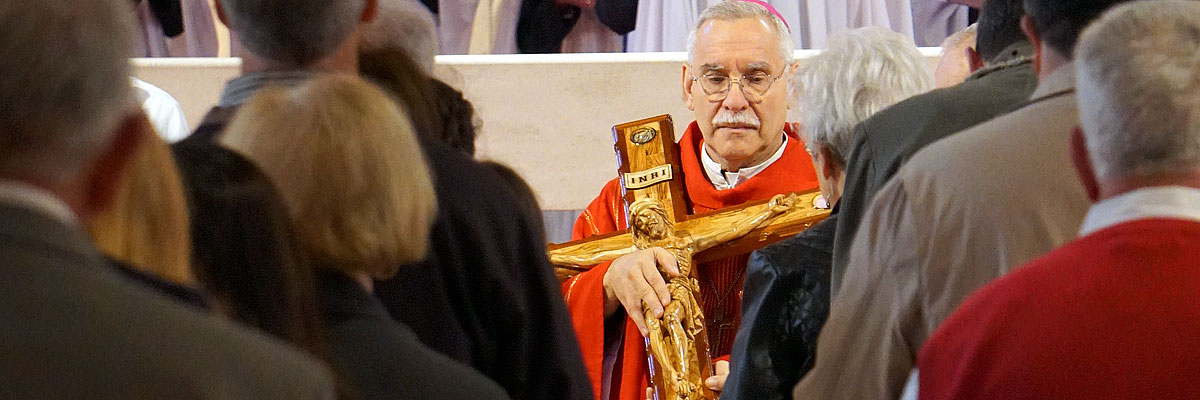Official Website of the
Catholic Diocese of Little Rock
Palm Sunday 2018
Published: March 25, 2018
Bishop Anthony B. Taylor preached the following homily at the Cathedral of St. Andrew in Little Rock on Sunday, March 25, 2018.

Bishop Taylor
Fight or flight? Animals flee danger and fight if they can't flee. Hikers seldom see any bears because they flee us. But back a bear into a corner and now you've got a fight or flight option to consider yourself. Wild animals don't trust us and the one thing they will not do is submit.
Yet that is precisely what Jesus did when the soldiers came to arrest him. His followers fled like wild animals but Jesus stayed and submitted. You can lead domesticated livestock to the slaughter-house. They submit because they trust us. Jesus trusted God the Father and so, like a lamb led to slaughter, he submitted.
When Jesus was arrested — we just read Mark's account — all of his disciples fled. Mark himself fled naked! Who else would remember such a detail 30 years later? You have to wonder what Mark was up to out in public covered only by the bedsheet he left in his pursuers' hands. There's bound to be more to that story!
(Jesus') followers fled like wild animals but Jesus stayed and submitted. You can lead domesticated livestock to the slaughter-house. They submit because they trust us. Jesus trusted God the Father and so, like a lamb led to slaughter, he submitted.
Peter's denials were another kind of flight, a flight from the truth. Peter feared that if the truth about his association with Jesus were known, they would arrest and crucify him too. And Pilate's decision to execute a man he knew to be innocent was a third kind of flight, an attempt to flee failure.
Pilate feared that the unrest surrounding Jesus might hurt his career, hurt him in his next performance evaluation. So to prevent more unrest and thus not fall out of favor with Caesar, he had an innocent man killed.
But the women stayed with Jesus. Our Gospel writers mention this only in passing because other than John, all the men had fled and so weren't even there to see this display of feminine courage. Mark would have found clothes by then but we don't see him at the cross.
Peter wept when the cock crowed but apparently without firm purpose of amendment. Otherwise he would have swallowed his pride, taken back his denials, traded his cowardice for courage and gone to Calvary to be there with Jesus, for whom he had earlier declared himself willing to die.
But one man, Joseph of Arimathea, was courageous that day and quite unexpectedly so because up to this point he had been only a secret admirer of Jesus. He belonged to the Sanhedrin — the same Jewish court that had convicted Jesus of blasphemy — and so for him now to acknowledge publicly his pro-Jesus sympathies had to have been political suicide.
Yet in sharp contrast to Mark and Peter and the other disciples who fled to save their skin, Joseph of Arimathea stepped forward at the very moment when it was absolutely the most dangerous time to do so. But he knew that as a member of the Sanhedrin he had unique access to Pilate and so with breathtaking courage, he used this access to do what he and probably no other Christian could do, even though to request Jesus' body meant revealing his pro-Jesus sympathies to everyone, including the rest of the Sanhedrin, and, most dangerous of all, to Pilate, the very man who had ordered Jesus' death.
How about us? What do we do when faithfulness to Jesus becomes difficult? If we change the subject when the truth becomes awkward, then aren't we even more cowardly than Peter? At least he was trying to avoid arrest; all we risk is a little unpleasantness.
If we tolerate injustice because we want peace at all costs, then aren't we even more cowardly than Pilate? At least his career was on the line; all we risk is a little unpleasantness.
Are we courageous enough to stick by Jesus when loyalty becomes awkward, or do we repackage cowardice as prudence and so flee, equivocate, dissemble, take false refuge in silence? Silence in the face of injustice amounts to cooperating with injustice, because when we don't challenge injustice we end up co-opted by it, even dependent on it.
And worse, how often do we actually join in when people say hateful things about our fellow human beings whom Jesus loves so much that he freely gave his life on the cross also for them? — No matter what their problems ... that's their issue, not ours!
When we make fun of others we are part of that crowd that made fun of Jesus. When we crown people with thorny reminders of past sins and personal defects, we press that same crown of thorns into the scalp of their savior and ours too — Jesus prayed for his persecutors; that's us he prayed for.
Whenever we call for the execution of a criminal, we are among those who shouted: "Crucify him, crucify him!" Jesus was innocent and the good thief could have been rehabilitated and things haven't changed much in 2,000 years.
I thank God that while cowardice and hatefulness had their day on that first Good Friday, it was courage that prevailed. If you and I are willing to be faithful at all costs, the Lord will give us the strength to be just as courageous today as the women and Joseph of Arimathea were then.









